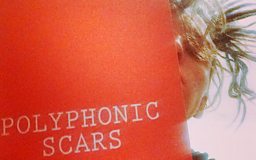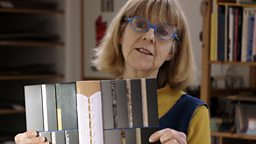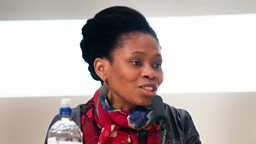Tech-free verse: How poet Lisa Luxx made the connection
13 June 2016
Alongside contemporaries such as Kate Tempest, Lisa Luxx is one of a generation of young poets and writers as much at home performing in song and video as writing verse. In her new book, Polyphonic Scars, Luxx addresses her fears that modern technology and social media is having a detrimental effect on her generation's culture and identity. BIDISHA discovers how disconnecting from technology led Luxx to a creative epiphany.

A few years ago, poet gave up technology.
Despite growing up in West Yorkshire in “breathtaking” surroundings, “for all of my teenage and adult life I had not been looking up, I hadn’t been engaging in nature whatsoever. I got my first mobile phone when I was 10, I learnt all that I know about being in the world through this device.
Polyphonic Scars is restless with a desire for connection, not only to nature but to other people
‘I learnt how to flirt, how to win an argument, how to project my identity. But my experience of life was devoid of texture and contemplation and eye contact. How can you tune in to your inner soliloquy when there’s a constant yapping in your ears and eyes?”
She went on a tech-free trip – ironically, through the American landscape surrounding Silicon Valley – which has resulted in her debut collection, Polyphonic Scars.
The book is a short, passionate, jittery bundle of romanticism and grit, yearning and dissatisfaction, part rural hippy, part urban hipster. It has a frantic, searching air which comes to rest at certain times on brilliant lines, when “privacy nested in its urn”, the Internet is a “blast of light” and a trip is taken “with loose boots that weren’t right/ and an old cell phone for a flashlight.”
When Luxx relaxes into her talent a soulful surety emerges and presents mature, powerful images: heat trickles like rain across skin, night lowers itself “like a body into a hot bath” and a lost phone makes “my jeans and I feel empty/ Like I’ve unscrewed a peg leg.”
Hiking in Yosemite National Park, the further she got, “the more my body ceased to exist/ As an object in the English language.”
Born in 1990, Luxx is one of the millennial generation much maligned for their pretension, arrogance and vapidity, the faux pose of their super-rehearsed, carefully styled and lifestyle-curated outsiderdom. In a brilliant phrase in Polyphonic Scars she nails “the dislocated culture of the totally in sync.”
Polyphonic Scars is restless with a desire for connection, not only to nature but to other people, like the intriguing woman she met in a bar, “telling stories of the bad boys she dated/ And their dead siblings.”
The book expresses the ambivalence of a generation who want to have their cake and be photographed eating it but suffer from a sense of emptiness at the thinness of their experience, a hunger for authenticity and profundity and a dawning dread at growing inequality.
To Luxx, “poetry is where people go to get a break from the rapid fire content of online.” I ask if she thinks twentysomethings have a push-pull, love hate relationship with technology and she agrees.
“Yes, it’s our heroin – we’re hooked on it, we need it to feel like we’re connecting with something holy and bigger than what already exists in our 3D life, but we know it’s changing us and that we may not come back from the places it takes us if don’t establish a stable relationship with it now. That’s why half my friends have the iPhone 6 and the other half have [old] Nokia 3310s.”
Polyphonic Scars places Lisa Luxx squarely in a generation of contemporary poets, including , , , and , who combine performance and verse with a fresh, bruised candour.
I don鈥檛 curate my Instagram particularly. But, if my life looks cool then that鈥檚 because it is coolLisa Luxx
Yet even though they may rail against technology’s ability to absorb time, attention and creativity, certain things are necessary if an artist wants to survive as “one hell of hustler” and “maintain the energy to keep shouting about your work in a space where everyone else is shouting just as loud.”
Luxx is a prolific maker of YouTube performance films of her poems, has launched an arts mag called whose website promises to document “the net-generation’s counter-cultures”, writes frank articles on lesbian dating for magazine and keeps her stylish adventures front and centre on Instagram.
She tells me, “I don’t curate my Instagram particularly. But, if my life looks cool then that’s because it is cool – if there’s one thing the blessing of depression has taught me, it’s to only do what makes me feel good.”
I’m surprised by her honesty about depression. Surely everything in Luxx land is photo-perfect all the time? In fact, Luxx is impressively open about the link between her mentality and her creativity:
“I always knew I was a poet because I learnt from a very early age that poetry was the only antidote to my intense feelings of anger and mania. When I was writing poetry, I wasn’t biting the neighbours.”
Even her videos, which I took to be cutting-edge calling cards, are more conflicted and complicated than they seem.
Poetry seems to be a uniquely elastic discipline, able to take an artist from the page to the screen to the stage to the music studio
She says, “I like to do poetry videos because the poetry scene – and it is a scene – thrives on poets who get out regularly to open mics”, but her depression keeps her “on a leash” and unwilling to perform live sometimes, “so I hope to show people who I am by doing videos.”
She’s developing her work into what she calls “lo fi filmmaking” with her latest release, Out of Sight, Out of Mind, which is also from Polyphonic Scars.
Luxx’s work is part of a new wave of creative, multi-disciplinary poetry presentation. For example, on 10th and 11th June, Kings Place in London hosted the first , which tossed together poetry, music and song and included events on classical Chinese verse and the poeticism of punk lyrics.
Opened by musician and broadcaster Cerys Matthews, it featured poet Liz Berry, whose collection was one of the most singular and impressive releases of recent years, national treasure John Hegley doing a family event and Radio 4 Poetry Slam champion Dizraeli.
Poetry seems to be a uniquely elastic discipline, able to take an artist from the page to the screen to the stage to the music studio.
While Poetry & Lyrics went on, Lisa Luxx was out of London, busy working on her first full length show, Germ, which gives “a fresh perspective on mental health” and “celebrates the unreasonable mind” and will be previewed at Latitude festival in July.
She’ll also be releasing her debut EP, Lovell, on the site Bandcamp, in collaboration with producer Mr Bones. Luxx describes it as “poetry in a crockpot with psychedelia and hip hop [as well as] field recordings and beats created from real world sounds.”
I hope Poetry & Lyrics returns next year and gives Lisa Luxx a slot as a fresh solo voice.
In the meantime, as the music-minded title Polyphonic Scars conveys so well, contemporary poetry doesn’t just have rhyme or rhythm, it can also carry a tune, style it out on Instagram and captivate audiences both live and on YouTube, diversifying, changing with the times and yet remaining as relevant, pure and powerful as ever.


Lisa Luxx performance poetry
Authors on 大象传媒 Arts
Performance poetry on the 大象传媒
Related Links


More from 大象传媒 Arts
-
![]()
Picasso鈥檚 ex-factor
Who are the six women who shaped his life and work?
-
![]()
Quiz: Picasso or pixel?
Can you separate the AI fakes from genuine paintings by Pablo Picasso?
-
![]()
Frida: Fiery, fierce and passionate
The extraordinary life of Mexican artist Frida Kahlo, in her own words
-
![]()
Proms 2023: The best bits
From Yuja Wang to Northern Soul, handpicked stand-out moments from this year's Proms



















































